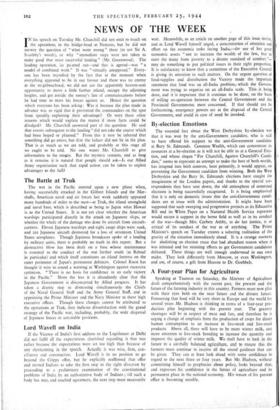NEWS OF THE WEEK
•
IN his speech on Tuesday Mr. Churchill did not omit to touch on the operations in the bridge-head at Nettuno, but he did not answer the question of " what went wrong " there (to use Sir A. Southby's words), or why " immediate steps were not taken to make good that most successful landing " (Mr. Greenwood). The landing operation, he pointed out—and this is agreed—was " a model of combined work." It was " virtually unopposed." Every- one has been mystified by the fact that at the moment when everything appeared to be in our favour and there was no enemy in the neighbourhood, we did not use the apparently heaven-sent opportunity to move a little farther inland, occupy the adjoining heights, and get astride the enemy's line of communications before he had time to mass his forces against us. Hence the question which everyone has been asking : Was it because the plan made in advance was so rigid that it prevented the commanders on the spot from speedily exploiting their advantage? Or were there other reasons which would explain the matter if more facts could be divulged? Mr. Churchill answered part of the question He said that events subsequent to the landing " did not take the course which had been hoped or planned." From this it may be inferred that something did go amiss, but that the failure did not lie in the plan. That is as much as we arc told, and probably at this stage all we ought to be told. No one wants Mr. Churchill to give information to the enemy. But the mystery remains, and as long as it remains it is natural that people should ask—Is our Allied Army organisation such that rapid action can be taken to exploit advantages to the full?


























 Previous page
Previous page